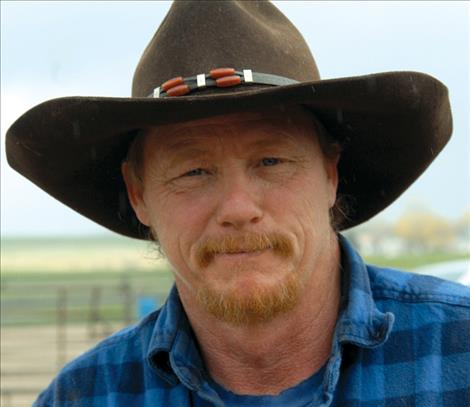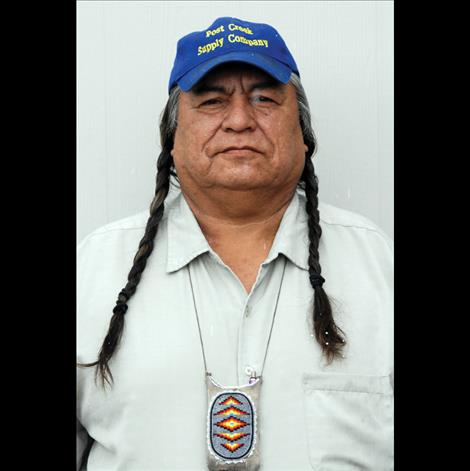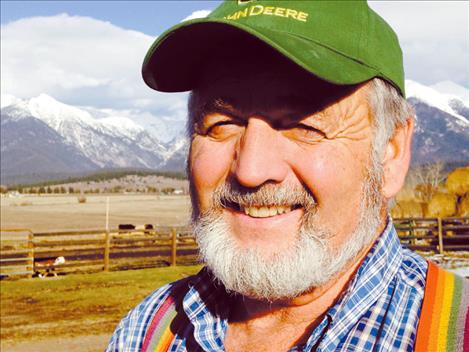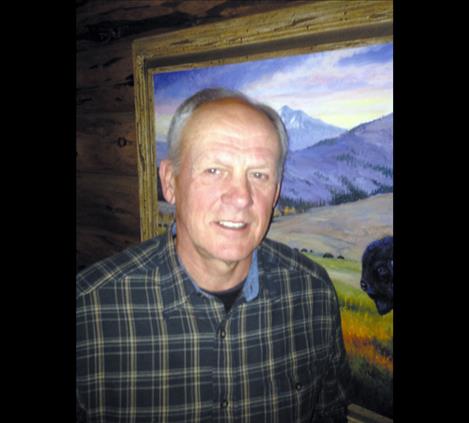Irrigation district commissioner candidates state their case
Hey savvy news reader! Thanks for choosing local.
You are now reading
1 of 3 free articles.
The irrigation district candidates for Jocko, Flathead and Mission Irrigation Districts were sent questionnaires, asking them to respond to two questions:
• What do you believe is the most important irrigation-related issue and what are your ideas for resolving that issue?
• What is your vision for the irrigation system in 10 years?
Flathead Irrigation District
Wade Shepard and Dick Erb are in the running for one seat for Flathead Irrigation Commissioner.
Shepard, 51, is a rancher who’s lived here all his life. He worked for the Flathead Indian Irrigation Project from 1984 to 2014. He’s running for a seat as Flathead Commissioner. “The most important issue is regaining local control,” Shepard said.
“The FJBC needs to work with the Bureau of Indian Affairs and everybody else to get whatever entity set back up to take the irrigation project over,” he said, adding that the joint board needs to be involved in what happens “so what happened last time doesn’t happen again.”
“Whether the compact passes or fails, we’re going to have to manage what water we have, and I believe that’s the best way to do it,” Shepard said.
Regarding the irrigation system in 10 years, “Well, it hinges on a few things. We need to improve it, and I’m not confident of the $55 million because of the channels it has to come back through to the FIIP,” Shepard said.
The Montana Legislature has appropriated $8 million for the project, but the remainder of the $55 million he’s talking about will have to be appropriated by the next legislature.
After watching the irrigation project working for four years under local control and 26 years under BIA, Shepard said he thinks the local control can do a lot more, dollar for dollar.
“I’m not confident of the money because it’s appropriated money,” he reiterated.
He also noted that if the compact passes, the irrigators are still liable for everything inside the compact.
“The project has run the way it has for over 100 years,” Shepard said. “All our improvements are going to be to the better. My concern is if tribe dictates how (the improvements) are done, we’ll start at the head end, on the fish screen and the water measurements. We need to work on lower end and work to the head so we can utilize every drop of water we’re allowed.”
Dick Erb operates a hay farm in Moiese and teaches an international finance course at the University of Montana. He and his wife have had family ties to this area for over 35 years and moved here 16 years ago.
“I raise hay on 240 irrigated acres. Based on my own irrigation experience and, more importantly, what I have learned about this large and diverse irrigation project from conversations with irrigators around the project and from when I served as FJBC Commissioner (2006-2009), I know this project faces many challenges,” Erb said. “I believe the most important challenge is maintaining historical project water deliveries at a reasonable cost per acre.”
“Many irrigators recall that court-ordered minimum instream flows implemented in the 1980s reduced water available for irrigation,” he said. “Any future increase in instream flows will reduce irrigation water unless there are significant operational improvements in the way water is delivered to and managed in the project.”
“If the Compact is approved by the state legislature, a Technical Team will be established to begin work immediately to verify historical water flows to the project and develop project improvements to be funded under the Compact. Irrigators will be able to appoint a person with relevant technical expertise to the Team. If elected I will work for the selection of a highly qualified person to this important position,” Erb said.
He added, “To control project operating costs, the FJBC needs to work with BIA to reestablish a local entity to manage the project. But for local control to be effective, the FJBC needs to do a much better job keeping irrigators informed and involved in all aspects of the FJBC’s work and deliberations.”
“If the Compact is not approved, the FJBC will have to pay litigation costs involving not only Montana Water Court deliberations but also U.S. Fish and Wildlife requirements to increase instream flows for bull trout. In the absence of Compact money, the FJBC also would need to find ways to fund project improvements,” Erb said.
Jocko Irrigation District
Clark Matt and Dean Brockway are both running for one seat as Jocko Irrigation Commissioner.
Matt, 67, is a rancher and retired from Smurfit-Stone. He has lived in the Arlee area all his life. He’s running for a seat as the Jocko commissioner.
“Well, I think if people fight the tribes, that’s a lot of money. I don’t think they should use tax dollars,” Matt said.
He added that if people want to fight the Water Compact, they should use their own money, not operation and maintenance money, which should go towards the Flathead Indian Irrigation Project.
The Bureau of Reclamation hasn’t really done a great job of serving the people, according to Matt.
As far as the Flathead Indian Irrigation Project in 10 years, Matt said, “I’m not much for sprinkler systems.”
Sprinklers are okay if they are low cost, he said, but they drop the water table for people who have wells. Sometimes people buy land that hasn’t been irrigated before, too.
“If you flood irrigate, the water table comes back up,” Matt explained.
He also said the canals used to flow all year long.
Candidate Dean Brockway did not return the questionnaire.
Mission Irrigation District
Tim Orr and Thomas Pavlock are vying for the open seat within the Mission Irrigation District.
Incumbent Orr is a 59-year-old farmer, rancher, laborer and truck driver who has lived in the area his entire life.
Orr said the issue most important to him is “keeping and retaining our historic water rights and volume, as appropriated by the USA in 1908-12, filed with the DNRC in 1982.”
He wants irrigators to retain property rights given through fee patents and make sure irrigators have the opportunity to retain their rights through the Montana Water Court.
He also wants the irrigation project to be returned to irrigator control through a governing body similar to the Cooperative Management Entity put in place in 2010.
“BIA project control history speaks for itself,” Orr said. “More work and project betterment was done from 2010-2014 than the previous 25 years by the BIA.”
Orr said hundreds of miles of canal were improved through tree removal, spraying efforts, and structure replacement in the four years the Cooperative Management Entity was in place.
“FIP needs that focus for the irrigators’ future and make water flow more efficiently,” Orr said.
Orr said his vision for the irrigation project in the next decade depends on whether or not local irrigators control the project.
“Common sense is the best solution for efficiency (in) project repairs,” Orr said. “My vision is irrigator control as the law says. I envision repairing … cement liners and structures first, then lining canals with high seepage rates second. This work can be done by the irrigation crew like we had hired in 2010. Main diversion work is highly costly and environmentally sensitive. This must be done in priority according to irrigation district input and guidance.”
Orr said he hopes irrigators can come together in the future.
“We need support from irrigators,” Orr said. “We are divided over issues the last few years. This division is not positive (for) our communities and common goals. We all have to work together to obtain the common goal of controlling and improving the Flathead Irrigation Project.”
Pavlock is a 68-year-old farmer who relocated full-time to St. Ignatius in 2006, after acquiring and incorporating a farm in 2004.
Pavlock said the most important issue facing the irrigation districts is finding a way forward after the Confederated Salish and Kootenai Water Compact passes or fails.
“By the time the ballots for Water Commissioner are counted, the Legislators will have spoken and the guidelines for distributing water within our district will be defined,” Pavlock said. “Finding the most appropriate and efficient way to get sufficient amounts of water to the ranchers and farmers in the district will be the significant issue moving forward. By working closely with the water users we can define a path forward within the framework the Legislature provides us.”
His vision for the irrigation system in the next decade is to return the irrigation project to local control.
“With continual improvements in the water delivery system, all user interests and requirements should be met satisfactorily,” Pavlock said. “Our vision should be to continue the vibrant agricultural base we have created in Western Montana. Only through working together can these goals be met. But the most important challenge in the next 10 years will be returning the day to day operational management of the irrigation system to local control. Local control has worked well in the past, can again with open-minded leadership, and will provide a sufficient supply of water to the generations that follow us.”
Pavlock said the past several years have put irrigators through several years of bitter experience, but that he hopes the community can come together moving forward.
“The goal of the Joint Water Board should be to bring the diverse interests of the water users together, singly focused on meeting the needs of the people,” Pavlock said. “The water-using community must put our differences aside, stop promoting hidden or personal agendas and focus on implementing the new water usage guidelines in the most efficient manner. It is time to work in a cooperative way to solve our mutual problems. With or without passage of the Compact, a positive approach will help find solutions as issues arise.”




















